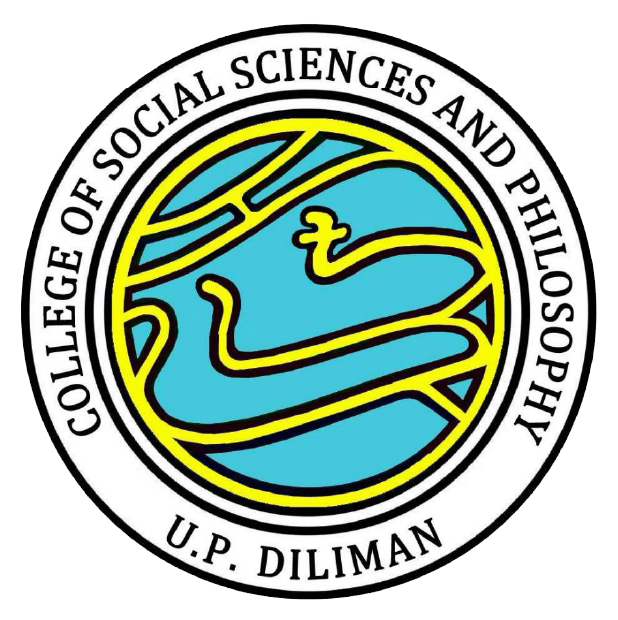Publications
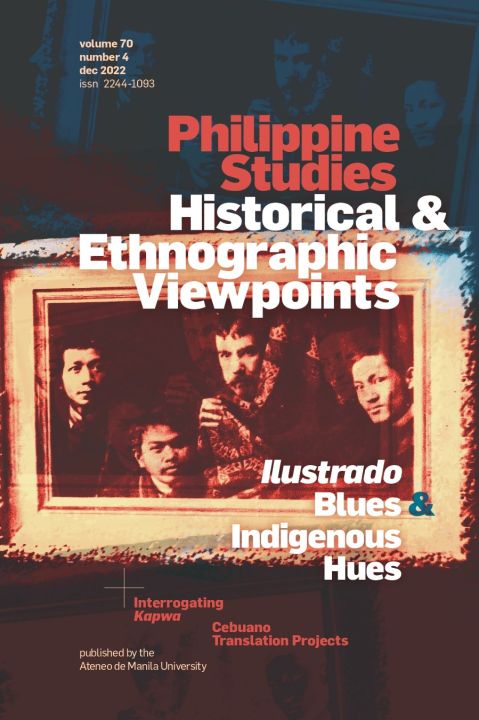
Homesickness and the Filipino Nation The Emotional Experience of Propagandists, 1889–1895
This study focuses on the emotional experience of homesickness of propagandists and relates it to the birthing of the Filipino nation in the late nineteenth century. I show that these young migrant men straddled two worlds, where both modern ideas of individualism and “parochial” sentiments of community existed together. Second, I demonstrate the change in the migrants’ gaze as it slowly began to include the larger entity of the nation. In the end, I argue that these points illustrate tensions found in a nascent nation as Filipinos navigated their emotions within the context of colonialism and modernity.
Marcelo del Pilar
Exile
History of Emotions
Nationalism
Propaganda Movement

The Philippine Army Capability Development Planning Process
The Philippine Army’s (PA) current capability development planning (CDP) process is rooted in the broader modernization effort of the Armed Forces of the Philippines (AFP) that was begun in the ‘90s. it follows the 21st century trend in long-term strategic planning where most Western-aligned countries have adopted capability-based planning (CBP) frameworks due to the flexibility, adaptability, and efficiency that they bring to the table. The PA’s own CDP process is embedded in a strategic planning logic that follows four main steps: an analysis of future defense and security scenarios; an assessment of current and required capabilities; the crafting of detailed rolling plans; and the listing of capital-intensive priority projects for immediate funding by the AFP. This process can best be seen in the recently completed PA Medium-Term Capability Development Plan for 2022 to 2028. The CDP process is followed by other steps in the strategic planning logic, including force structure and program development. Ultimately, the properly executed CDP in the PA provides decision-makers options to maximize the use of limited resources and thereby optimize the country’s military modernization.
Philippine Army
Capability Development
Capability-Based Planning
AFP Modernization Program

The Philippine Army Theory of Victory
As the Philippines progresses further into the 21st century, the unpredictability of security conditions creates multiple possibilities in terms of future threat scenarios. This ambiguity emphasizes the need for the country’s defense institutions to adapt and evolve through the development of defense capabilities, and as necessary, a redefinition of security policies, doctrines, and strategies. In exploring the future of Philippine ground warfare, current threats encountered by the Philippine Army are examined vis-à-vis the trend of hybridization, due to globalization, mass communication, and rapid technological innovation. To contribute to the discourse on the Philippines’ theory of victory, this paper argues that the concerted efforts of Army units, utilizing Landpower Maneuver, to supplement the actions of the Joint Force, will lead to enemy forces abandoning the idea of conflict in its entire spectrum due to loss of capability or will. The objective is to achieve an end-state where threats are deterred to start or continue conflict, by exploiting opportunities in all domains and dimensions of the security architecture. To further demonstrate the Philippine Army’s theory of victory, multiple future scenarios involving hybrid threats to the ground force are employed in this paper. Towards the end, an overview of how Philippine Army’s ground defense strategy and capability development direction are highlighted to describe the Army’s path to victory.
Philippine Army
Theory of Victory
Hybrid Threat
Hybrid Warfare
Landpower Maneuver
Capability Development
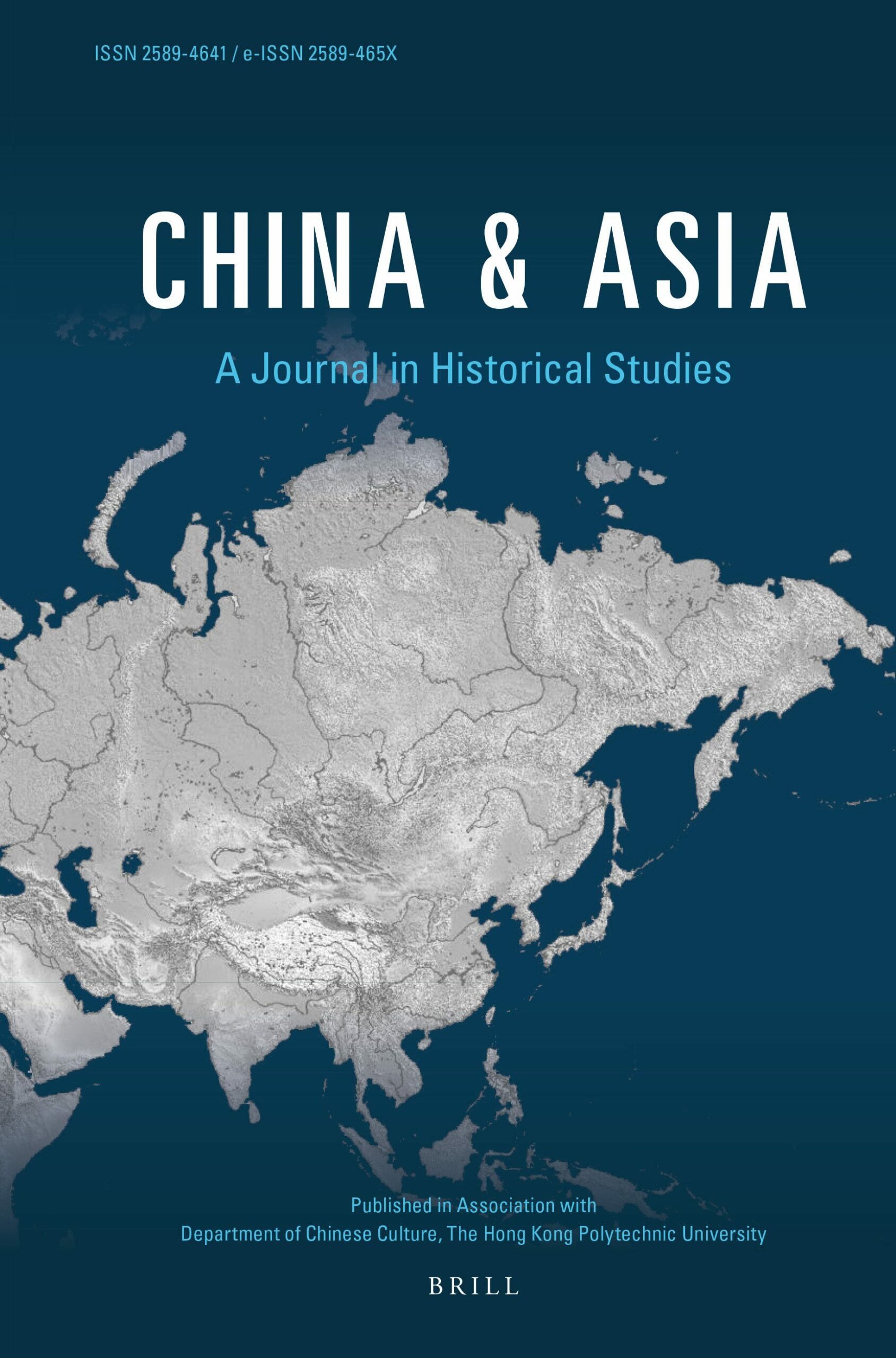
The Challenges to Prohibition: Opium Law, Opium Smuggling, and Chinese in the Philippines, 1910–1935
Opium was one of the issues that had to be resolved by the Americans upon their colonization of the Philippines. The debate on the potentialities of opium dates back to the Spanish colonial period, when the colonial government framed the opium issue as both economic and moral in nature. In the end, the economic potentialities of opium outweighed its moral repercussions because the Spanish colonial government allowed its regulated use among the Chinese. In contrast, the American officials in Manila crafted a progressive prohibitionist policy based on the recommendation of the investigative Opium Committee in 1905. In terms of opium in the Philippines, the majority of research has focused on the American policies on opium and their international consequences. This study focuses on the aftermath and challenges of the American prohibitionist policy from 1910 to 1935, particularly as they related to smuggling. Using archival documents such as annual reports from the governor-general of the Philippines and other government records, the paper aims to demonstrate how and in what ways opium was smuggled in the Philippines and to analyze the various motivations, reasons, and methods used by smugglers. Furthermore, the paper explores the involvement of the Chinese in various notable opium-related cases in the Philippines. I also argue that an increase in the smuggling of opium was an unwanted aftermath of the American prohibitionist policy. The present study hopes to contribute to the growing body of literature on narcotics, drug policies, and empire building.
drug policy
opium smuggling
American empire
Chinese in the Philippines

A Cultural Minority’s Disaster Survival Experience: The August 1968 Luzon Earthquake, the Ruby Tower Tragedy, and the Chinese in Manila
This paper narrates a history of the August 2, 1968 Luzon earthquake that severely hit the capital city of Manila in the Philippines. The central site of this earthquake disaster was the collapse of a premiere, high-rise residential building in downtown Manila, the Ruby Tower Apartments. This tragedy reflects the projection of nationalism in terms of collective disaster response, and the Philippines’ complicated dealings with a specific segment of the population. The Ruby Tower tragedy was an emblematic representation of the country’s disaster response capacities and Filipino society’s perception and treatment of the Chinese and Filipino Chinese residents in Manila. Using newspapers, magazine articles, and scientific reports about the earthquake, this study aims to present a microhistory of a cultural minority in Manila, specifically on how the sordid story of earthquake disaster survival projects a poignant picture of ethnic dynamics and disaster politics in the country in the 1960s.
August 2, 1968 earthquake
Ruby Tower Apartments
Chinese in Manila
disaster response
disaster memory
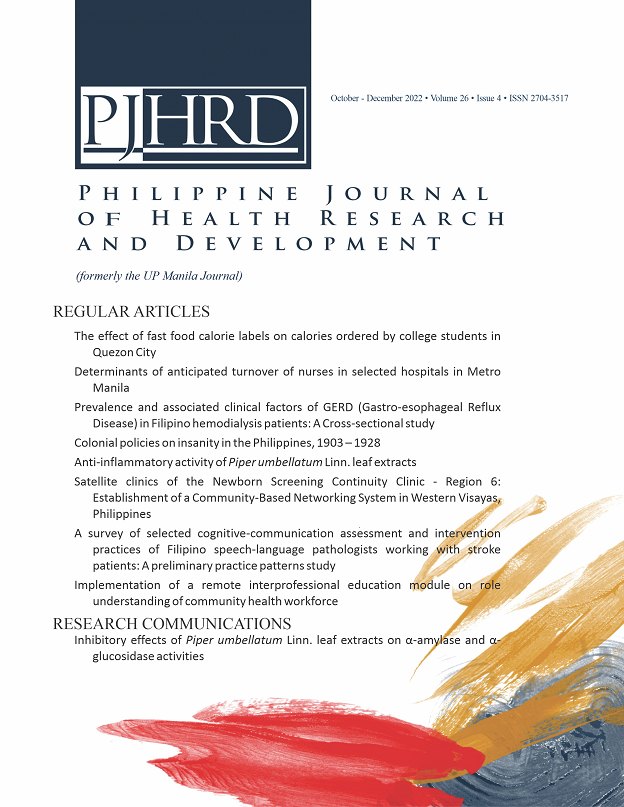
Colonial Policies on Insanity in the Philippines, 1903-1928
Despite the persistent relevance of mental health in the lives of Filipinos and the long tradition of mental health care in the Philippines, scholarly works on the history of mental illnesses and mental health institutions, particularly during the colonial period, remain scarce. This paper aimed to explore the various policies implemented by the American colonial government in the Philippines to address issues regarding insanity from 1903 to 1928. As a historical inquiry, the paper employed historical analysis in examining sources of data such as archival documents, official reports, bulletins, and statistics produced by the various offices of the American colonial government in the Philippines. Three specific policies were identified – the establishment of the Insane Department at the San Lazaro Hospital in 1904 as a response to the overcrowding and inadequate treatment methods at the Hospicio de San Jose, the Insane Department's adherence to the principles of moral treatment, and enactment of different laws pertinent to insane persons, most notably the Insanity Law of 1912.
The historical narrative shows that these policies had been used by the American colonial government to showcase their alleged benevolence and preserve public order. It was also demonstrated that the colonizers ultimately failed to develop the Insane Department as a modern insane asylum, as indicated by persistent problems such as overcrowding, lack of proper facilities, and outdated treatment methods.
The historical narrative shows that these policies had been used by the American colonial government to showcase their alleged benevolence and preserve public order. It was also demonstrated that the colonizers ultimately failed to develop the Insane Department as a modern insane asylum, as indicated by persistent problems such as overcrowding, lack of proper facilities, and outdated treatment methods.
insanity
Insane Department
San Lazaro Hospital
insanity law
colonial policies
Philippines

Los Chinos Macanistas: The Cantonese Chinese in the Philippines, 1778-1898
This paper explored the emergence and development of the macanista or Cantonese community in the Philippines from the late eighteenth century to the end of the Spanish regime. It aims (1) to examine how the Spanish colonial state viewed the Chinese community in general, and the Chinese dialect groups like the Cantonese in particular; (2) to provide a historical overview of Cantonese immigration to and settlement in the Philippines; and (3) to describe the economic contributions of Cantonese laboring classes in Manila and in the provinces. The paper intends to contribute to a more nuanced understanding of the economic and socio-cultural differences within the Chinese community in the Spanish Philippines.
Macanista
macao
Cantonese
Chinese
Philippine history
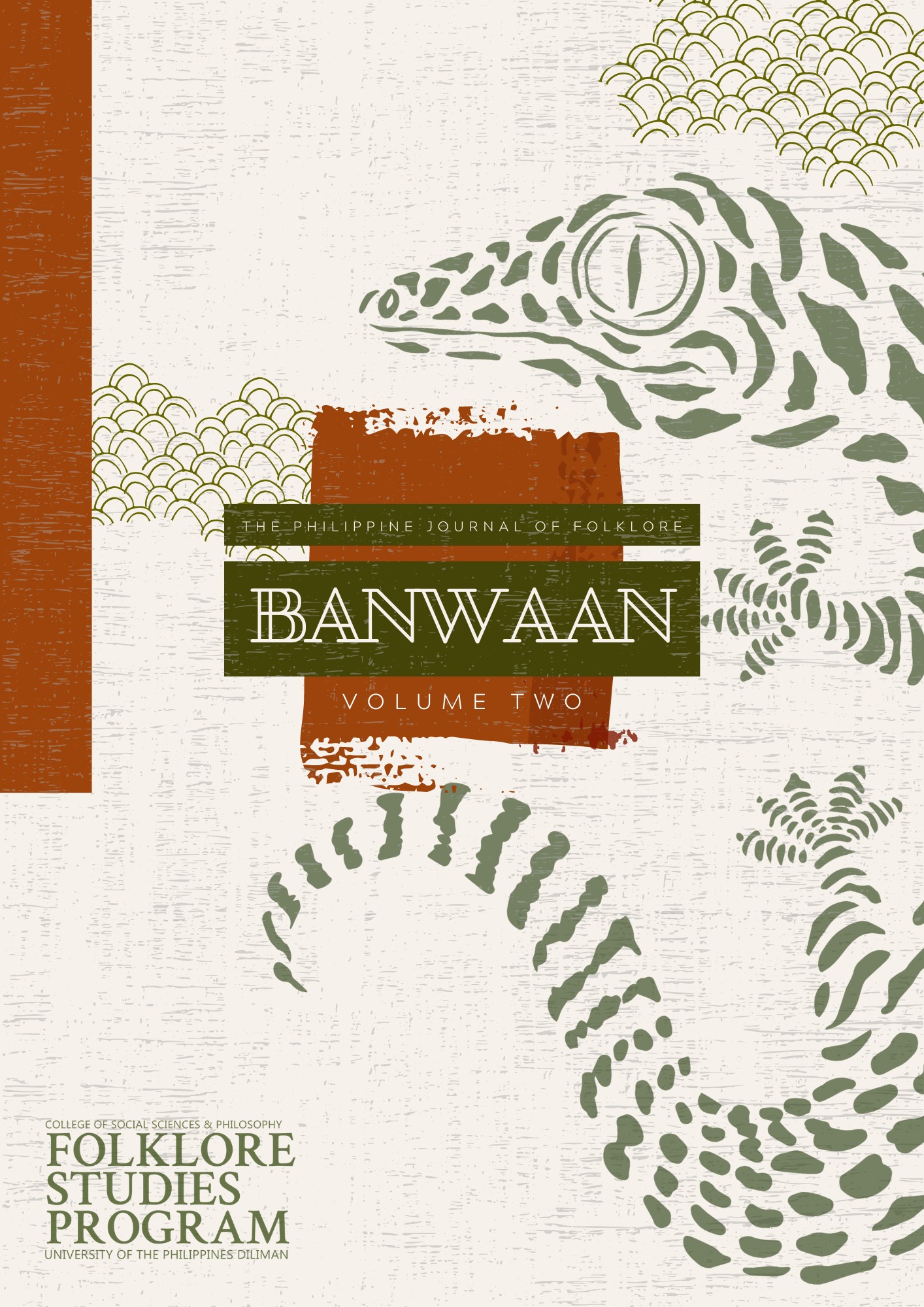
Marinduque Silencescapes: History and Stories of Local Silence
Details constituting the sound environments in the island province of Marinduque can be extracted and reconstructed from the H. Otley Beyer Ethnographic Collection papers written by Asunción M. Arriola, Nieves Hidalgo, Eduardo E. Palma, Serapio Rolloqui, Cornelio C. Restar, and Miguel Manguerra (1916-1928) and the writings of Rafael J. Semilla (1970- 71). With these sources one will be able to examine places identified with or produced by silence, which are here called “silencescapes”. Given the challenges on defining, reading, and historicizing silences and silencescapes, there is a need to situate these places of silence within meanings and functions in a culture and society. As a study that examines how silences produce places, it attempts to contribute to the current scholarship on geo- narratives, local history, and countermapping.
silencescapes
Marinduque
geonarratives
local history
countermapping

Science for National Development: State-Science Engagements through the Research Exploits of the National Research Council of the Philippines during the Commonwealth Period (1934-1941)
This essay intends to show that the state-science nexus during the Commonwealth period mobilized the Filipino scientific community through the NRCP’s research exploits despite limited government support and other challenges beyond the council’s control. It expounds on the nature of state-science engagements in other countries in order to understand how this operated within the Philippine setting. It then examines the Commonwealth’s vision for economic independence and how the Philippine state mobilized the NRCP by providing important but very limited support for the council’s research projects and activities. Finally, it probes into the council’s research works published in selected NRCP Bulletins from 1934 to 1941 in order to demonstrate how Filipino scientists tried to influence policy-making. This essay is an attempt to assess state-science engagements during the Commonwealth period as seen in the example of the NRCP which contributed not only to the national endeavor but most especially to the progress of Filipino science.
National Research Council of the Philippines
Philippine Commonwealth
national development
colonial science
state-science nexus

Francisco Gaínza and the Establishment of the Escuela-Colegio de Santa Isabel: The Pursuit of Hispanization in the Diocese of Cáceres, 1863-1877
Javier Leonardo V. Rugeria
The few existing historiography generally regard the establishment of the Escuela-Colegio de Santa Isabel as one of Francisco Gaínza’s greatest initiatives and accomplishments during his seventeen-year episcopacy in the Diocese of Cáceres. They argue that Santa Isabel forms part of the bishop’s ecclesiastical and educational legacies for Bikol. While these accounts underscore Gaínza’s role in the school’s foundation, they obscure his rationale and the wider backdrop of the Spanish Empire that conditioned its possibility. This article locates Gaínza and the establishment of Santa Isabel within Spain’s wider efforts to reorganize primary education in the Philippines in the 1860s. It argues that Santa Isabel was established to serve the purposes of Spain’s civilizing mission of Hispanizing the native population, and that Gaínza, an agent of the Spanish Empire by virtue of the Patronato Real (Royal Patronage) operated within this colonial discourse.
Francisco Gaínza
Escuela-Colegio de Santa Isabel
Cáceres
Hispanization
education
| Title | Journal | Faculty Involved | Keywords | Year |
|---|---|---|---|---|
| "More Calories, More Protein, More Progress": The Nutribun and the Politics of Nostalgia of the Marcos Regime | Philippine Studies: Historical and Ethnographic Viewpoints | Francisco Jayme Paolo A. Guiang | Nutrition, Ferdinand E. Marcos, Nostalgia, International Aid, Health Communication | 2025 |
| Law Between Two Empires: Marriage and Divorce in the Evolving Philippine Legal System under the Early US colonial Period, 1898–1917 | South East Asia Research | Lorenz Timothy Barco Ranera | Legal history, marriage, divorce, Supreme Court, mixed legal system, Philippines | 2025 |
| Scientific Textualizations of Tropical Cyclones in the Philippines: The Scientific Activities of the Observatorio Meteorológico de Manila (OMM) and Philippine Weather Bureau (PWB), 1860s-1940s | History of Meteorology | Kerby C. Alvarez, Ph.D. | typhoons, Philippine Weather Bureau, Philippines, Observatorio Meteorológico de Manila, tropical cyclones | 2025 |
| From Religious to Political Ideologies: Historicizing Geopolitical Encounters and Their Impact on International Order in the Modern World | Asia-Pacific Dialogue: Advancing Cooperation in a New Era | Vicente C. Villan, Ph.D. | Historical Context, Geopolitics, Ideological Systems, International Relations, Empire Formation | 2025 |
| Colonial Integration: The Native Soldiers under Governor Sebastián Hurtado de Corcuera, 1635-1640 (Integración colonial: Los soldados indígenas bajo el gobierno de Sebastián Hurtado de Corcuera, 1635-1640) | Estudios de Historia Novohispana | Moises Levi Orlino | Sebastián Hurtado de Corcuera, native soldiers, Pampango, Tagalog, Chinese insurrection | 2025 |
| ‘Balatyagon, Huya, kag Kabalaslan’: Ang Kampanya ng mga Pilipinong Baptist tungo sa Pagsasarili at Pagsasakapangyarihan, 1922–1935 | Malay: Internasyonal na Journal sa Araling Filipino | Kristoffer R. Esquejo, Ph.D. | ABFMS, CPBC, Filipinisasyon, Iskismong Panrelihiyon, Kinagisnang Sikolohiya | 2025 |
| Recording Maladies and Remedies: Isabelo de los Reyes and Folk Medicine in Late Nineteenth Century Philippines | Banwaan: The Philippine Journal of Folklore | Joseph Adrian D. Afundar | folk medicine, El Folk-Lore Filipino, Isabelo de los Reyes, folklore, history of medicine | 2025 |
| Isabelo’s Nature and Weather: Exploring Isabelo de los Reyes’ Notes on the Physical Environment in the El Folk-Lore Filipino (1889) | Banwaan: The Philippine Journal of Folklore | Kerby C. Alvarez, Ph.D. | Isabelo de los Reyes, physical environment, folk knowledge, local history, knowledge production | 2025 |
| Authoring the Folk | Banwaan: The Philippine Journal of Folklore | Emmanuel Jayson V. Bolata | Leona Florentino, Isabelo de los Reyes, folk literature, Ilocano literature, author | 2025 |
| Legal Codification of Family-Related Filipino Proverbs (Salawikain) in the Civil Code of the Philippines, 1947-1949 | Banwaan: The Philippine Journal of Folklore | Lorenz Timothy Barco Ranera | folklore, proverbs, legal history, family law, Philippines | 2025 |
| Is Sungka a Wargame? An Investigation into Conflict and Strategy within Pre-Colonial Philippine Ludic Culture | Banwaan: The Philippine Journal of Folklore | Micah Jeiel R. Perez | sungka, folk game, wargame, warfare, strategy | 2025 |
| Juan Luna as nationalist painter and hero: examining configurations of public memory in the Philippines | South East Asia Research | Grace Liza Y. Concepcion, Ph.D. | Public memory, Philippines, Juan Luna, commemorations, paintings, museums | 2025 |
| The End of World War II in the Philippines, August-September 1945 | Journal of Philippine Local History & Heritage | Ricardo T. Jose, Ph.D. | 2024 | |
| The Role of Principalia in the Religious Life of Pueblos in Laguna in the 17th Century | Journal of Philippine Local History & Heritage | Grace Liza Y. Concepcion, Ph.D. | 2024 | |
| Saplot: Isang historiograpikong pagsipat sa pamanang pangkasuotan at modang sining ng mga Pilipino | NEU Kaningningan Journal: An Interdisciplinary and Multidisciplinary Journal of New Era University Center for Philippine Studies | Vicente C. Villan, Ph.D. | Historiograpiya, Kasuotan sa Pagsasakasaysayan, Meta-komunikasyon, Meta-mensahe, Meta-naratibo, Pagsasakasaysayang Pilipino | 2024 |
| Proto-Modern Astronomy in the Philippines: A History of Words, 10th-19th Century | The Archive | Emmanuel Jayson V. Bolata | Philippine astronomy, proto-modern astronomy, ethnoastronomy, Austronesian languages, Sanskrit, Arabic, Malay | 2024 |
| Pleasure Trail: American Land Travels to Baguio, 1900s to 1920s | The Cordillera Review: Journal of Philippine Culture and Society | Carlos Joaquin R. Tabalon | Baguio, American colonial period, travel writing, highland-lowland, mobilities | 2024 |
| A Dependent Empire: The Military Activities of the Filipino Natives in Spanish Taiwan, 1589-1642 | TALA: An Online Journal of History | Moises Levi Orlino | Spanish Taiwan, Isla Hermosa, Native Soldiers, Pampangans, Formosa | 2024 |
| Pagpapalawak ng Edukasyong Pangkagubatan sa Konteksto ng Zambales (1900-1930) | Journal of Philippine Local History and Heritage | Janet S. Reguindin-Estella, Ph.D. | Kagawaran ng Paggugubat, edukasyong pangkagubatan, siyentipikong kasanayan, administratibong pamamahala, kolonyalismong Estados Unidos | 2024 |
| Evaluating the Origins of Project Gintong Alay and Philippine Sports’ ‘Golden Years’ Under the Marcos Administration, 1978–1982 | Asian Journal of Sport History & Culture | Micah Jeiel R. Perez | Gintong Alay, Ferdinand Marcos, Michael Keon, martial law, Philippine sports | 2024 |
| Eighteenth-Century Colonial Leyte: Challenges in Administrative Jurisdiction and Tribute Collection | Journal on Philippine Local History and Heritage | Ros A. Costelo, Ph.D. | Leyte, eighteenth-century Leyte, colonial administrative jurisdiction, tribute, indigenous resistance, division of province | 2024 |
| A History of Institutional Meteorology in the Philippines, 1865-1972 | Oxford Research Encyclopedia of Climate Science | Kerby C. Alvarez, Ph.D. | Observatorio Meteorológico de Manila, Philippine Weather Bureau, meteorology, institutional meteorology, Jesuit scientists, Filipino scientists | 2024 |
| Revisiting Alzona: Internationalism in Philippine National Education (1917–1961) | Historical Bulletin | Micah Jeiel R. Perez | Encarnacion Alzona, Education, Nationalism, Internationalism | 2023 |
| Si Dante L. Ambrosio at ang Kasaysayan ng Etnoastronomiyang Pilipino, 1992–2010 (Dante L. Ambrosio and the History of Philippine Ethnoastronomy, 1992–2010) | Historical Bulletin | Emmanuel Jayson V. Bolata | Dante L. Ambrosio, etnoastronomiya, balatik, kilusang manggagawa, kapaligiran | 2023 |
| Pagsasakasaysayan ng Klima, Kalangitan, at Kalamidad: Historyograpikong Sarbey sa mga Akdang Siyentipiko at Historikal ni Miguel P. Selga, 1920s–1972 | Historical Bulletin | Kerby C. Alvarez, Ph.D. | Miguel Selga, meteorolohiya, seismolohiya, astronomiya, Philippine Weather Bureau | 2023 |
| Patronage, Weak Institutions, and the Failure to Establish a National Oceangoing Fleet: A Historical Interrogation, 1938-1988 | Philippine Social Sciences Review | Karl Friedrik K. Poblador, Ph.D. | shipping, National Development Company, Philippine economic history, rent-seeking, cronies | 2023 |
| The Curse of the Tablas Strait: An Interrogation of Maritime Accidents from 1902-2008 | Banwaan: The Philippine Journal of Folklore | Karl Friedrik K. Poblador, Ph.D. | interisland shipping, maritime disasters, Tablas Strait, Doña Paz, Romblon Triangle | 2023 |
| Stars of Portent: Comets and Disasters in the Philippine Past, 1566-1910 | Banwaan: The Philippine Journal of Folklore | Emmanuel Jayson V. Bolata | comet, disasters, ethnoastronomy, astrology, Philippine astronomy | 2023 |
| Explosions et représentations : vignettes scientifiques et culturelles des éruptions du Taal | Frontières | Kerby C. Alvarez, Ph.D. | Taal volcano, volcanic hazards, historical eruptions, geological studies, folklores | 2023 |
| Ang Larong Sungka Bilang Pamanang Bayan sa Pananaliksik at Pagbuo ng Kaalamang Pangkasaysayan sa Pilipinas | NEU Kaningningan Journal: An Interdisciplinary and Multidisciplinary Journal of New Era University Center for Philippine Studies | Vicente C. Villan, Ph.D. | Katutubong Laro, Sungka, Pamanang Kultural, Ekspresibong Kultura, Panlipunang Produksyon | 2023 |
| Dominican Missionaries and the Importation of Unwanted Chinese Children to the Philippines in the Mid-Nineteenth Century | Journal of the Society for Asian Humanities | Jely A. Galang, Ph.D. | Philippine history, Dominicans, Chinese children, Child emigration, Charity, Labour question | 2023 |
| The 1864 Sino-Spanish Treaty and the Chinese in the Philippines, 1871-1896 | Chinese Studies Journal | Jely A. Galang, Ph.D. | Sino-Spanish Treaty, Chinese, Philippine history, diplomatic history | 2023 |
| Kapaki-pakinabang na Moda ng Transportasyon? Mga Pananaw ng Diskursong Historiograpikal sa Trambiya ng Kolonyal na Kamaynilaan | HAMAKA E-Journal | Carlos Joaquin R. Tabalon | trambiya, Maynila, kolonyalismo, transportasyon | 2023 |
| An Institutional History of Nayong Pilipino Foundation, 1970-2015 | Nayon: Journal of Natural and Cultural Heritage Inaugural Issue | Patrick James B. Serra | cultural tourism, Philippine heritage, Philippine studies, theme park | 2023 |
| Writing 'La Universidad de Manila' Anew: La Solidaridad and the Revival of José María Panganiban's Campaign for Reforms in Higher Education, 1890-1891 | Bikolnon: Journal of the Ateneo de Naga | Javier Leonardo V. Rugeria | José María Panganiban, La Solidaridad, enseñanza superior (Philippine higher education), secularization, Propaganda Movement | 2023 |
| Evidence of Active Resistance against the Japanese before the Fall of Corregidor: The Case of Luzon, 1941-1942 | Journal of Philippine Local History and Heritage | Javier Leonardo V. Rugeria | Teodoro Agoncillo, Ablan-Madamba Guerrilla Forces, Tangkong Vaca Guerrilla Unit, Camp Isarog Guerrillas, Filipino-American Irregular Troops (FAIT) | 2023 |
| The First Shipping Magnates of Cebu: A History of Domestic Shipping in the Philippines. | Journal of Philippine Local History and Heritage | Karl Friedrik K. Poblador, Ph.D. | Domestic shipping, Maritime disasters, Aboitiz, William Lines, Gothong, Superferry | 2023 |
| Cultivating Knowledge: T. H. Pardo de Tavera and Philippine Medicinal Flora | The Archive | Ma. Mercedes G. Planta, Ph.D. | 2023 | |
| The 16th century Carrera del Pacífico: its sailor-merchants and their trade goods | Philippine Review of Economics | Kristyl N. Obispado, Ph.D. | Pacific trade, sailor-merchants, early globalization, Philippine-Chinese good | 2023 |
| Teksto at Talastasan: Pagmumuni at Pagbabalangkas sa Kasaysayan-bilang-Komunikasyon | Talas: Interdisiplinaryong Journal sa Edukasyong Pangkultura | Emmanuel Jayson V. Bolata | kasaysayan, komunikasyon, dialogo, may-akda, teksto, deviation | 2023 |
| Greening with Exotics: Mount Makiling and Reforestation Discourses in the Twentieth-Century Philippines | Philippine Studies: Historical and Ethnographic Viewpoints | Ruel V. Pagunsan, Ph.D. | Postwar Forestry, Forest Rehabilitation, Exotic Trees, Natural Laboratory, National Science | 2023 |
| Observing Heavens, Marking Time: The Astronomical Work of the Observatorio Meteorológico de Manila (OMM), later reorganized as the Philippine Weather Bureau (PWB), 1891-1945 | Journal of Astronomical History and Heritage | Kerby C. Alvarez, Ph.D. | Observatorio Meteorológico de Manila, Philippine Weather Bureau, astronomy, meteorology, Jesuits | 2023 |
| Ang Noumenal at ang Nominal sa Panulaan ni Allan Popa. | Daluyan: Journal ng Wikang Filipino | Emmanuel Jayson V. Bolata | 2022 | |
| Institutional Support and Crony Capitalism: The State of the Philippine Shipping Industry during the period of Authoritarian Rule | Diliman Review | Karl Friedrik K. Poblador, Ph.D. | shipping, crony capitalism, presidential decrees, IMF lending, Lusteveco | 2022 |
| Social Criticism during the Commonwealth Period: Renato Constantino and the Philippine Collegian, 1939-1940 | Diliman Review | Francisco Jayme Paolo A. Guiang | Philippine Collegian, Philippine Commonwealth, prewar Philippines, nationalism, social criticism | 2022 |
| Tracing the Provenance of Marinduque Toponyms | Social Science Diliman | Emmanuel Jayson V. Bolata | Marinduque, toponyms, placenaming, local history | 2022 |
| A Historical Seismology of Luzon Earthquakes in the 20th Century: The Dynamics of State Responses on Four Earthquake Disasters | Philippine Social Sciences Review | Kerby C. Alvarez, Ph.D. | Earthquakes, Luzon island, historical seismology, state responses, military, scientific institutions | 2022 |
| Fact-Checking ‘Fake News’ and Disinformation: Notes on Akademiya at Bayan Kontra Disimpormasyon at Dayaan’s (ABKD) Social Media Initiatives | Pingkian: Journal for Emancipatory and Anti-Imperialist Education | Francisco Jayme Paolo A. Guiang | fact-checking, fake news and disinformation, social media platforms, Marcosian disinformation, 2022 national elections | 2022 |
| Walking in UP Diliman as Ethnographic and Countermapping Practice | Banwaan: The Journal of Philippine Folklore | Emmanuel Jayson V. Bolata | walking, walk-map, autoethnography, countermapping, UP Diliman | 2022 |
| Translation of "Cayetano Sanchez Fuertes’ “Fray Juan Duarez OFM, Founder of the Town of Daraga (Philippines) | Saysay: The Journal of Bikol History | Ros A. Costelo, Ph.D. | Fr. Juan Duárez de Santa Cruz, Franciscan missions in the Philippines, , History of Camarines, Mayon Volcano, History of Daraga, History of Cagsawa | 2022 |
| Homesickness and the Filipino Nation The Emotional Experience of Propagandists, 1889–1895 | Philippine Studies: Historical and Ethnographic Viewpoints | Rhodalyn C. Wani-Obias, Ph.D. | Marcelo del Pilar, Exile, History of Emotions, Nationalism, Propaganda Movement | 2022 |
| The Philippine Army Capability Development Planning Process | The Jacinto Papers: Army Strategic Studies | Micah Jeiel R. Perez | Philippine Army, Capability Development, Capability-Based Planning, AFP Modernization Program | 2022 |
| The Philippine Army Theory of Victory | Future of Philippine Warfare | Micah Jeiel R. Perez | Philippine Army, Theory of Victory, Hybrid Threat, Hybrid Warfare, Landpower Maneuver, Capability Development | 2022 |
| The Challenges to Prohibition: Opium Law, Opium Smuggling, and Chinese in the Philippines, 1910–1935 | China and Asia: A Journal of Historical Studies | Dondy Pepito G. Ramos II | drug policy, opium smuggling, American empire, Chinese in the Philippines | 2022 |
| A Cultural Minority’s Disaster Survival Experience: The August 1968 Luzon Earthquake, the Ruby Tower Tragedy, and the Chinese in Manila | China and Asia: A Journal of Historical Studies | Kerby C. Alvarez, Ph.D. | August 2, 1968 earthquake, Ruby Tower Apartments, Chinese in Manila, disaster response, disaster memory | 2022 |
| Colonial Policies on Insanity in the Philippines, 1903-1928 | Philippine Journal of Health Research and Development | Francis Justine M. Malban | insanity, Insane Department, San Lazaro Hospital, insanity law, colonial policies, Philippines | 2022 |
| Los Chinos Macanistas: The Cantonese Chinese in the Philippines, 1778-1898 | Chinese Studies Journal | Jely A. Galang, Ph.D. | Macanista, macao, Cantonese, Chinese, Philippine history | 2022 |
| Marinduque Silencescapes: History and Stories of Local Silence | Banwaan: The Philippine Journal of Folklore | Emmanuel Jayson V. Bolata | silencescapes, Marinduque, geonarratives, local history, countermapping | 2022 |
| Science for National Development: State-Science Engagements through the Research Exploits of the National Research Council of the Philippines during the Commonwealth Period (1934-1941) | Philippine Social Sciences Review | Francisco Jayme Paolo A. Guiang | National Research Council of the Philippines, Philippine Commonwealth, national development, colonial science, state-science nexus | 2021 |
| Francisco Gaínza and the Establishment of the Escuela-Colegio de Santa Isabel: The Pursuit of Hispanization in the Diocese of Cáceres, 1863-1877 | Saysay: The Journal of Bikol History | Javier Leonardo V. Rugeria | Francisco Gaínza, Escuela-Colegio de Santa Isabel, Cáceres, Hispanization, education | 2021 |
| The COVID-19 Pandemic: Insights from Philippine History | The Journal of History | Ma. Mercedes G. Planta, Ph.D. | COVID-19 pandemic, Philippine history, smallpox, influenza pandemic, vaccination | 2021 |
| Chinese Prisoners in the Nineteenth Century Philippines | China and Asia: A Journal of Historical Studies | Jely A. Galang, Ph.D. | Chinese prisoners, Philippine history, crime, punishment, prison | 2021 |
| Deportation of “Undesirable” Chinese in the Philippines, 1837-1882. | Translocal Chinese: East Asian Perspectives | Jely A. Galang, Ph.D. | deportation, social undesirables, Chinese, Philippine history | 2021 |
| Ang Pagsusunong ng Pupuwa ng Kababaihang Gaseña | Daluyan: Journal ng Wikang Filipino | Emmanuel Jayson V. Bolata | Bearing of pupuwa, women, Gasan, Marinduque, tradition, devotion | 2021 |
| Flight and freedom: Chinese fugitives and the Spanish colonial state in the nineteenth-century Philippines | Social Science Diliman | Jely A. Galang, Ph.D. | Chinese, fugitives, flight, criminality, Philippine history | 2021 |
| José María Panganiban’s “La Universidad de Manila” and the Liberal Campaign for Reforms in Philippine Higher Education | Philippine Studies: Historical and Ethnographic Viewpoints | Javier Leonardo V. Rugeria | Jose Maria Panganiban, University of Santo Tomas, Propaganda movement, Philippine education, secularization | 2021 |
| Expulsion of “Undesirable” Chinese from the Philippines, 1883–1898 | Journal of Chinese Overseas | Jely A. Galang, Ph.D. | outcasts, expulsion, Chinese criminals, Philippines | 2021 |
| Hacienda Gomantong: The 1888 Chinese Immigration Decree, A German Tobacco Plantation, and Chinese Laborers in Jolo, Sulu, Southern Philippines | Asian Studies: Journal of Critical Perspectives on Asia | Jely A. Galang, Ph.D. | September 1888 Immigration decree, Hacienda Gomantong, Chinese in Jolo, tobacco cultivation in the Philippines | 2021 |
| Nature, Colonial Science and Nation-building in the Twentieth-Century Philippines | Journal of Southeast Asian Studies | Ruel V. Pagunsan, Ph.D. | 2021 | |
| Living Carriers in the East: Chinese Cargadores in Nineteenth-Century Manila | Philippine Studies: Historical and Ethnographic Viewpoints | Jely A. Galang, Ph.D. | Chinese, Manual Laborers, Philippine History, Nineteenth Century, Spanish Colonialism | 2021 |
| Producing “Idolatry:” Indigenous Knowledge Production via Colonial Investigations into Animism, Luzon, 1679–1687 | Philippiniana Sacra | Nicholas Michael C. Sy | Knowledge production, Missionary, Church, Philippines, Early Modern, Spanish Empire, Conversion, Idolatry | 2021 |
| Play and Propaganda: The Sports of the Ilustrados in Nineteenth-Century Europe | Philippine Studies: Historical and Ethnographic Viewpoints | Micah Jeiel R. Perez | Ilustrado, sports, nationalism, masculinity, modernity | 2020 |
| Pagkaligaw at Pamamaybay sa Elcano & Magellan (Being Lost in and Coasting Along Elcano & Magellan) | Katipunan | Emmanuel Jayson V. Bolata | Magellan, Elcano, Lapu Lapu, Samar, ligaw, baybay | 2020 |
| Gunitang Bayan at Salaysaying Bayan: Ang Pamanang Lahi sa Pag-unawa ng Kalakarang Panlipunan at Produksyong Pangkaalaman sa Pilipinas. Nasa Talas: Interdisiplinaryong Journal sa Edukasyong Pangkultura | Talas: Interdisiplinaryong Journal sa Edukasyong Pangkultura | Vicente C. Villan, Ph.D. | pamana, gunita, positibismo, kaalamang-bayan, kasaysayan | 2020 |
| The Manila Waterworks System: Water Distribution, Access, and Control in the Second Half of the Nineteenth Century | Illes i imperis | Ros A. Costelo, Ph.D. | Manila waterworks system, sanitary infrastructures, water distribution, water access, water control, colonial public works | 2020 |
| The June 1863 and the July 1881 Earthquakes: Interpretations and Responses | Illes i imperis | Kerby C. Alvarez, Ph.D. | Earthquakes, religious responses, Spanish bureaucracy, Jesuits, colonial engineers | 2020 |
| Prosecuting the “Criminals”: “Undesirable” Chinese and Court System in the Nineteenth-century Philippines | Philippine Social Science Review | Jely A. Galang, Ph.D. | Chinese, criminality, judicial apparatus, court system, Philippine history | 2019 |
| Did municipal elites intermarry? A case study of marriage practices among the political elites of San Pablo, Laguna, 1853–1854 | Philippine Studies: Historical and Ethnographic Viewpoints | Nicholas Michael C. Sy | Exogamy, Intermarriage, Colonial Historiography, Quantitative Case Study, Political Elite | 2019 |
| Tungo sa unang sentenaryo ni Bonifacio: Mga Pakikibaka at Pagpupunyagi para sa Supremo ng Katipunan, 1897–1963 | Social Science Diliman | Kristoffer R. Esquejo, Ph.D. | araling gunita, Bonifacio, Himagsikang 1896, Katipunan, Supremo | 2019 |
| Ang Dalawang Maria ng Malabon: Panata Bilang Pagsasabuhay sa mga Pagpapahalagang Pilipino sa Konteksto ng Ugnayang Pangkasaysayan at Pangkalinangan ng La Inmaculada Concepcion at La Purisima Concepcion ng Malabon | DIWA E-Journal | Kerby C. Alvarez, Ph.D. | Faith, Devotion, La Inmaculada Concepcion, La Purisima Concepcion, Virgin Mary, Malabon | 2019 |

